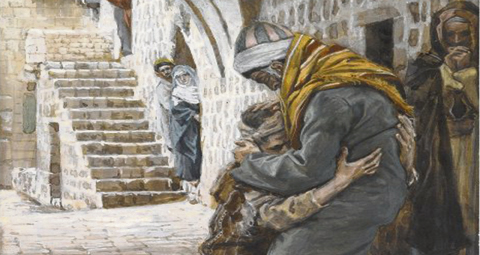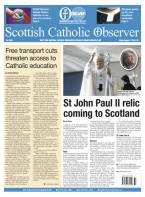September 26 | ![]() 0 COMMENTS
0 COMMENTS ![]() print
print

Fatherless at the depth of our being
By Fr Ronald Rolheiser
Anthropologists tell us that father-hunger, a frustrated desire to be blessed by our own fathers, is one of the deepest hungers in the world today, especially among men. Millions of people sense that they have not received their father’s blessing. Robert Bly, Robert Moore, Richard Rohr, and James Hillman, among others, offer some rich insights into this.
We suffer from being fatherless. However, in its deepest root, this suffering is something far beyond the mere absence of a blessing from our biological fathers. We tend to be fatherless in a much deeper way.
How so?
Some 25 years ago, a French philosopher, Jean-Luc Marion wrote a book entitled, God Without Being, within which he offers a very challenging interpretation of the famous parable of the Prodigal Son.
We are all familiar with the parable: A father had two sons. The younger comes to him and says: “Father give me the share of the property that’s coming to me.” His father shares out his goods. The younger son takes his share, leaves for a distant country, and squanders his property on a life of debauchery. When he has finally spent everything, he finds himself hungry and humiliated and sets off to return to his father’s house, where he is undeservedly greeted, embraced, and taken back by his father (right).
At one level, the lesson is clear: God’s mercy is so wide and compassionate that nothing we can do will ever stop God from loving us. Many wonderful books have been written to highlight this, not least Henri Nouwen’s classic, The Return of the Prodigal Son.
But Jean-Luc Marion, drawing upon the specific wording of the Greek text, emphasises another element in this story. The Greek text implies that the son went to his father and asked for something more than property and money. It says that he asked his father for his share of the property (ousia). Ousia, in Greek, means ‘substance.’ He’s asking for his life, as independent of his father. Moreover, as a son and an heir, he already has use of his share of what is rightfully his; but he wants to own it and not owe it to anyone. He wants what is rightly his but he wants to have it as independent of his father, as cut off from his father, and as his own in a way that he no longer has to acknowledge his father in the way he receives his life and freedom and uses them. And the consequence of that, as this parable makes clear, is that a gift no longer sensed or acknowledged as gift always leads to the misuse of that gift, to the loss of integrity, and to personal humiliation.
With an apology for the abstractness of Marion’s language, here is what he sees as the deepest issue inside this story: “The son requests that he no longer have to request, or rather, that he no longer have to receive the ousia… He asks to possess it, dispose of it, enjoy it without passing through the gift and the reception of the gift. The son wants to owe nothing to his father, and above all not owe him a gift; he asks to have a father no longer—the ousia without the father or the gift… [And] the ousia becomes the full possession of the son only to the extent that it is fully dispossessed of the father: dispossession of the father, annulment of the gift, this is what the possession of the ousia implies. Hence an immediate consequence: in being dispossessed of the father, the possession that censures the gift integrates within itself, indissolubly, the waste of the gift: possessed without gift, possession cannot
but continue to dispossess itself. Henceforth orphan of the paternal gift, ousia finds itself possessed in the mode of dissipation.”
The prodigal son’s real issue was not so much his hunger for pleasure as his hunger for the wrong kind of independence. He wanted his life and the freedom to enjoy life completely on his own terms and, for him, that meant he had to take them outside his father’s house. In doing that, he lost his father and he also lost genuine life and freedom because these can only be had inside the acceptance a certain dependence.
That is why Jesus repeated again and again, that He could do nothing on His own. Everything he was and everything He did came from His Father.
Our lives are not our own. Our lives are a gift and always need to be received as gift. Our substance is not our own and so it may never be severed from its source, God, our Father. We can enter our lives and freedom and enjoy them and their pleasures, but as soon as we cut them off from their source, take them as our own and head off on our own, dissipation, hunger, and humiliation will follow.
There is life only in the Father’s house and when we are outside that house we are fatherless and wasting our ousia.
—Fr Ronald Rolheiser is a Catholic priest and member of the Missionary Oblates of Mary Immaculate. He is president of the Oblate School of Theology in San Antonio, Texas. Visit his website at www.ronrolheiser.com











